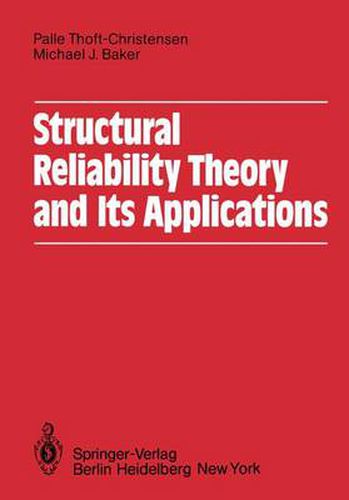Readings Newsletter
Become a Readings Member to make your shopping experience even easier.
Sign in or sign up for free!
You’re not far away from qualifying for FREE standard shipping within Australia
You’ve qualified for FREE standard shipping within Australia
The cart is loading…






This title is printed to order. This book may have been self-published. If so, we cannot guarantee the quality of the content. In the main most books will have gone through the editing process however some may not. We therefore suggest that you be aware of this before ordering this book. If in doubt check either the author or publisher’s details as we are unable to accept any returns unless they are faulty. Please contact us if you have any questions.
Structural reliability theory is concerned with the rational treatment of uncertainties in struc tural engineering and with the methods for assessing the safety and serviceability of civil en gineering and other structures. It is a subject which has grown rapidly during the last decade and has evolved from being a topic for academic research to a set of well-developed or develop ing methodologies with a wide range of practical applications. Uncertainties exist in most areas of civil and structural engineeri'1.g and rational design decisions cannot be made without modelling them and taking them into account. Many structural en gineers are shielded from having to think about such problems, at least when designing simple structures, because of the prescriptive and essentially deterministic nature of most codes of practice. This is an undesirable situation. Most loads and other structural design parameters are rarely known with certainty and should be regarded as random variables or stochastic processes, even if in design calculations they are eventually treated as deterministic. Some problems such as the analysis of load combinations cannot even be formulated without recourse to probabilistic reasoning.
$9.00 standard shipping within Australia
FREE standard shipping within Australia for orders over $100.00
Express & International shipping calculated at checkout
Stock availability can be subject to change without notice. We recommend calling the shop or contacting our online team to check availability of low stock items. Please see our Shopping Online page for more details.
This title is printed to order. This book may have been self-published. If so, we cannot guarantee the quality of the content. In the main most books will have gone through the editing process however some may not. We therefore suggest that you be aware of this before ordering this book. If in doubt check either the author or publisher’s details as we are unable to accept any returns unless they are faulty. Please contact us if you have any questions.
Structural reliability theory is concerned with the rational treatment of uncertainties in struc tural engineering and with the methods for assessing the safety and serviceability of civil en gineering and other structures. It is a subject which has grown rapidly during the last decade and has evolved from being a topic for academic research to a set of well-developed or develop ing methodologies with a wide range of practical applications. Uncertainties exist in most areas of civil and structural engineeri'1.g and rational design decisions cannot be made without modelling them and taking them into account. Many structural en gineers are shielded from having to think about such problems, at least when designing simple structures, because of the prescriptive and essentially deterministic nature of most codes of practice. This is an undesirable situation. Most loads and other structural design parameters are rarely known with certainty and should be regarded as random variables or stochastic processes, even if in design calculations they are eventually treated as deterministic. Some problems such as the analysis of load combinations cannot even be formulated without recourse to probabilistic reasoning.